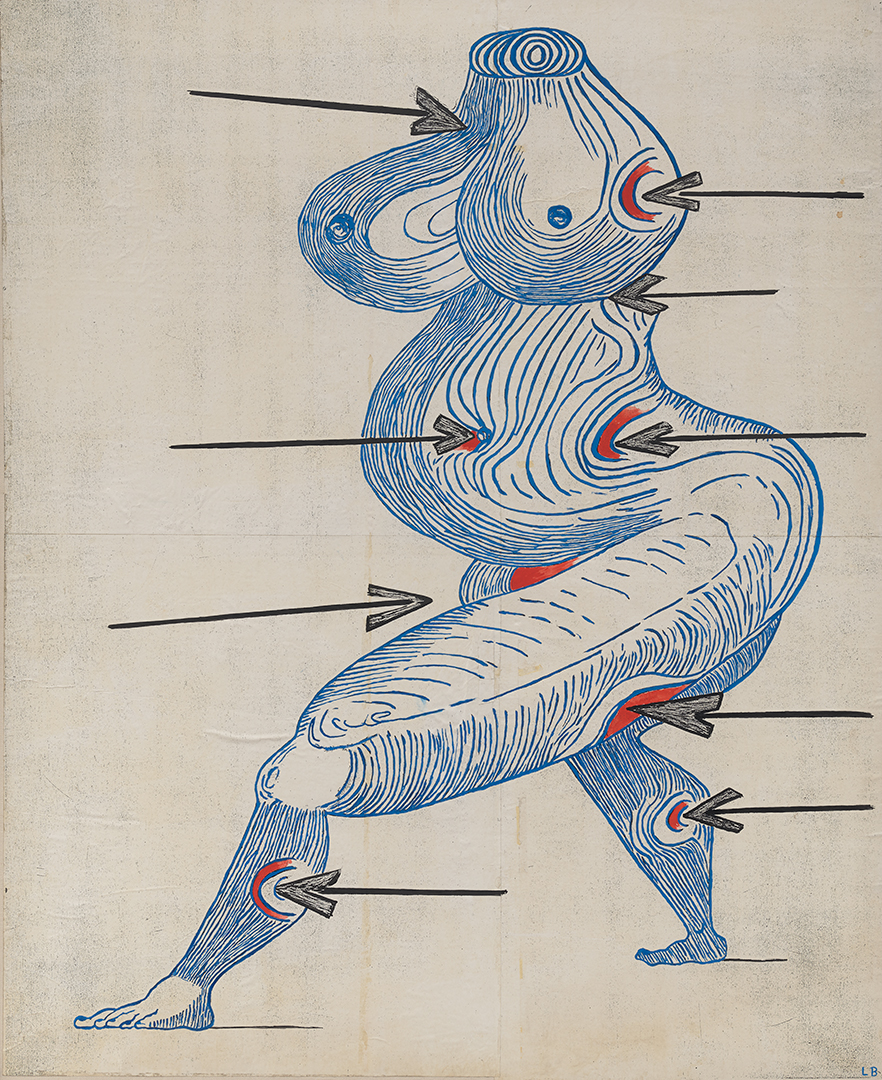Glenstone Museum to Present a Survey Exhibition of the Work of Louise Bourgeois, Opening May 10

Ste. Sébastienne, 1998
ink on Xerox paper mounted on canvas
77 ½ x 63 inches (197 x 160 cm)
© The Easton Foundation/VAGA at Artists Rights Society (ARS), NY
Photo: Ron Amstutz
Louise Bourgeois: To Unravel a Torment Will Explore the Career of the Trailblazing Artist; Exhibition Includes the Recently Acquired Installation The Destruction of the Father
Glenstone Museum today announced that its next exhibition, Louise Bourgeois: To Unravel a Torment, will open to the public on May 10. It will be presented in the museum’s original exhibition space, the Gallery, and will remain on view when Glenstone opens its new building, the Pavilions, and expanded landscape on October 4. The exhibition will remain on view through January 2020.
The trailblazing work of French-born American artist Louise Bourgeois (1911–2010) will be the subject of a five-decade survey exhibition featuring nearly 30 works, all from Glenstone’s collection, including a recently acquired masterpiece that was realized at a pivotal moment in her career: the 1974 installation The Destruction of the Father.
“At Glenstone we strive to collect and exhibit works that changed the history of art, and even our ideas about what art can be—which is why we’re thrilled to present this survey of the career of Louise Bourgeois,” said Emily Wei Rales, director and co-founder of Glenstone. “She was a radical figure who pursued her own course for decades with wit, intelligence, and daring—at times out of step with prevailing taste and ideas. Today we recognize her as an icon of late 20th century art, a proto-feminist who combined personal narrative and psychological insight with extraordinary artistic innovations.”
On view in the exhibition will be a selection of early wooden “Personage” sculptures; pieces in bronze, marble, plaster, and rubber; suites of drawings and prints; textile-based works; and room-like installations that she called “Cells.” In these works Bourgeois forged a unique vocabulary, powerfully and idiosyncratically expressing psychic states and emotions such as anger, fear, and loneliness, and often evoking a sense of disquiet about the strangeness of the human body. In 1974, Bourgeois made a precursor to these Cells with her first installation, The Destruction of the Father, a theatrically-lit diorama depicting primal violence served up as a commentary on domineering father figures and the imaginary revenge they inspire.
“This remarkable exhibition marks the beginning of a long collaboration between Bourgeois and Glenstone,” said Jerry Gorovoy, president of The Easton Foundation, the non-profit organization that Louise Bourgeois established to preserve her artistic legacy and promote scholarship about her life and work. “The museum’s in-depth holdings of Bourgeois’s complex body of work give you the full range of her formal inventiveness, and its collection of her late work is unparalleled in any museum in the world. Glenstone’s extraordinary commitment to Bourgeois, and to all the artists in its collection, is executed at such a high level of sensitivity and intelligence. Bourgeois’s artistic legacy will be both preserved and extended by this unique institution.”
An illustrated catalogue accompanying the exhibition, published by Glenstone and distributed by Artbook DAP, will feature an essay by Briony Fer, previously unpublished diary entries by Louise Bourgeois annotated by Philip Larratt-Smith, an introduction by Emily Rales, and installation images of the exhibition Louise Bourgeois: To Unravel a Torment. A schedule of public programs presented in conjunction with the exhibition will be announced at a later date.
This is the final exhibition at the museum before Glenstone opens the Pavilions, a multi-year expansion project that will provide the museum with an additional 50,000 square feet of indoor exhibition space; a new public entrance and arrival hall; a bookstore; two cafés; new outdoor sculptures; and 130 additional acres of landscape.
Visits to Louise Bourgeois: To Unravel a Torment can now be scheduled online at glenstone.org/visit. Admission to Glenstone is always free.
Media Contact:
[email protected]